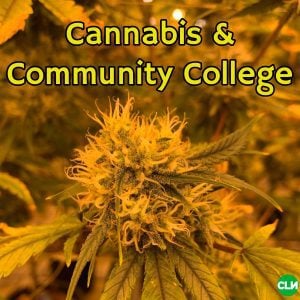Community College Cannabis Vocational Pilot Program in Illinois
What is the Community College Cannabis Vocational Pilot Program in Illinois?
 The Community College Cannabis Vocational Pilot Program in Illinois is designed to train experts who will manage the cannabis industry in future. A community college in this case means any public community college.
The Community College Cannabis Vocational Pilot Program in Illinois is designed to train experts who will manage the cannabis industry in future. A community college in this case means any public community college.
Here is what you need to know:
Administration of the IL Cannabis Program
The department of agriculture will be in charge of administering the community college cannabis vocational pilot program in the state of Illinois. By the time the law takes effect in January 2020, the agriculture department aims to have licensed at least 8 programs in community colleges within the state.
By 2021, the colleges that will already have a license to offer the cannabis program will be allowed to start training interested students. The aim here is to prepare students to enter the cannabis industry. Training will be focused both on business and professional practices, as well as the legal issues that players in the industry will have to be knowledgeable about.
Not just everyone will be allowed to undertake the cannabis program. All participants will need to be at least 18years of age to enroll in this training. In addition, there will be certificates awarded by community colleges to those individuals who successfully undergo training on how to manage cannabis businesses.
Issuance of Community College Cannabis Vocational IL Cannabis Pilot Program Licenses
Licenses will be issued as from the year 2020. All colleges that are interested in offering this course will be required to submit their applications for licenses by July 1 2020. The licenses will be awarded on merit, and the agriculture department will be tasked with the responsibility of coming up with a system to rank the licensing applicants. Some factors which will be considered include:
- Geographical diversity
- Clear curriculum plan
- Faculty experience in marijuana and related fields
- 5 of the licenses will be awarded to institutions with over 50% low-income student population
- Security measures put in place to ensure that cannabis plants and products do not land in the wrong hands.
- Placement plan for students who successfully go through the program
Community College Cannabis Vocational Pilot Program Requirements:
Institutions that get approval to run the pilot program will be required to follow some rules. First, the institution will not be allowed to have more than 50 cannabis plants at the flowering stage at any given time. None of the plants or its product will be shipped from the institution unless the samples are being taken to the lab. Additionally, the college will have to appoint an agent who maintains a vault log of the people who enter the cannabis facility. Other requirements include:
- Access to the marijuana growing area will be limited. The curriculum will only be available to those who are undertaking the cannabis course
- A transporting company will have to be contracted to transport cannabis products from the community college to the lab.
- All cannabis products that do not end up in the lab should be destroyed within 5 weeks after they are harvested.
- A faculty agent should be at the cannabis facility at all times whenever there is a student. The law states that,” No student participating in the cannabis curriculum necessary to obtain a certificate may be in the licensee’s facility unless a faculty agent-in-charge is also physically available.’’
Inspections and Random Checks by Police
The agriculture and the state police department have a right to conduct random checks on the facilities. The random checks will only be limited to the locations where the cannabis facilities are situated.
Cultivation Center Agent Identification Card
This is an identification document that will be issued to cultivation center agents responsible for managing and ensuring that these centers are compliant with the law. This document will be issued by the Department of Agriculture.
How to Obtain a Faculty Agent Identification Card
An individual has to submit an application and pay a non-refundable fee to be given the faculty agent identification card. The card will also need to be renewed at intervals. An individual will know whether their card has been approved or rejected within 30 days after submitting their application. It is important to note that all relevant documents need to be submitted for the application to go through.
The information contained in the identification card includes:
- The cardholder’s name
- The date the card was issued
- Card expiration date
- An alphanumeric identification number. This number will contain 10 digits with at least 4 letters and 4 numbers
- The card holder’s photograph
- The name of the community college where the cardholder is employed
What Happens if the Law is Broken?
The department of agriculture will have a right to revoke any faculty agent’s card if they not adhere to rules as stipulated in the cannabis law. The program license may also be revoked if it violates any of the articles in this law. The law also says that, “The Board shall revoke the authority to offer the certificate of any community college that has had its license revoked by the Department”
- Security incidents witnessed at all licensed facilities. There should also be adequate details on what actions were taken in the institutions where the incidents were recorded.
- Statistics on students who enrolled in any cannabis related program. These statistics should be based on gender, ethnicity, and the community college.
- The number of students who have successfully completed the cannabis program in different licensed institutions
- Statistics on job placement for students after completion of the programs
Thomas Howard has been in business for years and can help yours navigate towards more profitable waters.
Thomas Howard was on the ball and got things done. Easy to work with, communicates very well, and I would recommend him anytime.
Our cannabis business attorneys are also business owners. We can help you structure your business or help protect it from overly burdensome regulations.


